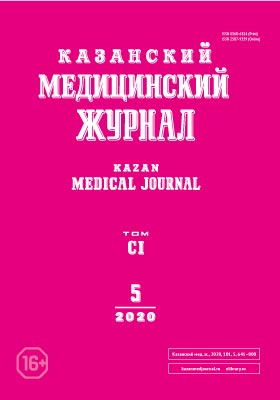Комплексный подход к коррекции анемии в предоперационном периоде при резекциях печени у пациентов с колоректальным раком и метастатическим поражением печени
- Авторы: Алборов А.Э.1,2, Ханевич М.Д.1,2, Бессмельцев С.С.1, Розанова О.Е.1, Глазанова Т.В.1, Романенко Н.А.1
-
Учреждения:
- Российский научно-исследовательский институт гематологии и трансфузиологии Федерального медико-биологического агентства
- Городской клинический онкологический диспансер
- Выпуск: Том 101, № 5 (2020)
- Страницы: 677-684
- Раздел: Теоретическая и клиническая медицина
- Статья получена: 25.06.2020
- Статья одобрена: 19.08.2020
- Статья опубликована: 27.10.2020
- URL: https://kazanmedjournal.ru/kazanmedj/article/view/34846
- DOI: https://doi.org/10.17816/KMJ2020-677
- ID: 34846
Цитировать
Аннотация
Цель. Изучить особенности патогенеза анемии у пациентов с колоректальным раком и метастатическим поражением печени и оценить эффективность патогенетической коррекции анемии в предоперационном периоде.
Методы. Включены 90 больных колоректальным раком с метастатическим поражением печени и анемией (содержание гемоглобина 75–95 г/л), находившихся под наблюдением в Городском клиническом онкологическом диспансере Санкт-Петербурга с 2014 по 2020 гг. Пациентов разделили на две группы. В первую группу вошли пациенты, оценённые проспективно, им в предоперационном периоде анемию корригировали с помощью препаратов железа (внутривенно 7 мг/кг 1 раз в неделю) и рекомбинантного эритропоэтина (подкожно 150 МЕ/кг 3 раза в неделю). Во вторую группу вошли больные, оцениваемые ретроспективно, им анемию корригировали лишь с помощью трансфузий эритроцитов (1–3 дозы). Группы были сопоставимы по полу (мужчины/женщины 17:31 в первой группе и 16:26 во второй; р >0,5), возрасту (63,3±1,4 года в первой группе, 60,2±1,2 года во второй; p >0,1), содержанию гемоглобина (87,4±1,0 г/л в первой группе и 86,7±0,9 г/л во второй; p >0,2).
Результаты. В ходе изучения причинных факторов развития анемии у большинства пациентов выявлено снижение уровня эндогенного эритропоэтина (36,7±1,9 мМЕ/мл при долженствующем 70 мМЕ/мл). Обнаружено снижение концентрации сывороточного железа (6,6±0,3 против 15,1±0,8 мкмоль/л) и ферритина (15,5±1,9 против 102,4±8,4 мкг/мл). При этом не выявлено разницы концентрации провоспалительных цитокинов у пациентов с анемией и здоровых доноров (фактора некроза опухоли α, интерлейкина-1β, интерлейкина-6; p >0,2), что свидетельствует о низкой активности иммунной системы в ответ на опухоль, обусловленной уже проводимой химиотерапией. В ходе предоперационной коррекции анемии получен положительный эффект с помощью как препаратов железа и эритропоэтина (уровень гемоглобина повысился с 87,6±1,0 до 108,1±0,9 г/л; р <0,01), так и трансфузий эритроцитов (с 86,7±0,9 до 114,6±0,6 г/л; р <0,01).
Вывод. У пациентов с колоректальным раком и метастатическим поражением печени наиболее вероятными причинами анемии были низкий уровень эритропоэтина и дефицит железа в организме; для предоперационной коррекции анемии у такой категории больных эффективно назначение препаратов эритропоэтина и железа внутривенно.
Полный текст
Об авторах
Александр Эдуардович Алборов
Российский научно-исследовательский институт гематологиии трансфузиологии Федерального медико-биологического
агентства; Городской клинический онкологический диспансер
Автор, ответственный за переписку.
Email: albor3331990@mail.ru
Россия, г. Санкт-Петербург, Россия; г. Санкт-Петербург, Россия
Михаил Дмитриевич Ханевич
Российский научно-исследовательский институт гематологиии трансфузиологии Федерального медико-биологического
агентства; Городской клинический онкологический диспансер
Email: albor3331990@mail.ru
Россия, г. Санкт-Петербург, Россия; г. Санкт-Петербург, Россия
Станислав Семёнович Бессмельцев
Российский научно-исследовательский институт гематологиии трансфузиологии Федерального медико-биологического
агентства
Email: albor3331990@mail.ru
Россия, г. Санкт-Петербург, Россия
Ольга Егоровна Розанова
Российский научно-исследовательский институт гематологиии трансфузиологии Федерального медико-биологического
агентства
Email: albor3331990@mail.ru
Россия, г. Санкт-Петербург, Россия
Татьяна Валентиновна Глазанова
Российский научно-исследовательский институт гематологиии трансфузиологии Федерального медико-биологического
агентства
Email: albor3331990@mail.ru
Россия, г. Санкт-Петербург, Россия
Николай Александрович Романенко
Российский научно-исследовательский институт гематологиии трансфузиологии Федерального медико-биологического
агентства
Email: albor3331990@mail.ru
Россия, г. Санкт-Петербург, Россия
Список литературы
- Давыдов М.И., Аксель Е.М. Статистика злокачественных новообразований в России и странах СНГ в 2009 г. Вестн. РОНЦ им. Н.Н. Блохина РАМН. 2011; 22 (3, прил. 1): 85.
- Патютко Ю.И., Сагайдак И.В., Поляков А.Н. и др. Хирургическое и комбинированное лечение больных колоректальным раком с метастатическим поражением печени. Тазовая хирургия и онкология. 2011; (1): 32–40. doi: 10.24412/Fhr0i8_-Ots.
- Секачёва М.И., Полищук Л.О., Багмет Н.Н., Скипенко О.Г. Результаты хирургического лечения метастатического колоректального рака после проведения лекарственной терапии с добавлением бевацизумаба. Соврем. онкол. 2012; 14 (2): 38–41.
- Зорина Е.Ю., Орлова Р.В. Прогностические факторы опухолевого процесса у больных диссеминированным колоректальным раком. Тазовая хирургия и онкология. 2014; (2): 33–40. doi: 10.17650/2220-3478-2014-0-2-33-40.
- Falcone A., Ricci S., Brunetti I. et al. Phase III trial of infusional fluorouracil, leucovorin, oxaliplatin, and irinotecan (FOLFOXIRI) compared with infusional fluorouracil, leucovorin, and irinotecan (FOLFIRI) as first-line treatment for metastatic colorectal cancer: the Gruppo Oncologico Nord Ovest. J. Clin. Oncol. 2007; 25: 1670–1676. doi: 10.1200/JCO.2006.09.0928.
- Klinger M., Tamandl D., Eipeldauer S. et al. Bevacizumab improves pathological response of colorectal cancer liver metastases treated with XELOX/FOLFOX. Ann. Surg. Oncol. 2010; 17: 2059–2065. doi: 10.1245/s10434-010-0972-9.
- Tournigand C., Cervantes A., Figer A. et al. OPTIMOX1: a randomized study of FOLFOX4 or FOLFOX7 with oxaliplatin in a stop-and-go fashion in advanced colorectal cancer — a GERCOR study. J. Clin. Oncol. 2006; 24: 394–400. doi: 10.1200/JCO.2005.03.0106.
- Ychou M., Hohenberger W., Thezenas S. et al. A randomized phase III study comparing adjuvant 5-fluorouracil/folinic acid with FOLFIRI in patients following complete resection of liver metastases from colorectal cancer. Ann. Oncol. 2009; 20: 1964–1970. doi: 10.1093/annonc/mdp236.
- Ychou M., Viret F., Kramar A. et al. Tritherapy with fluorouracil/leucovorin, irinotecan and oxaliplatin (FOLFIRINOX): a phase II study in colorectal cancer patients with non-resectable liver metastases. Cancer Chemoth. Pharmacol. 2008; 62: 195–201. doi: 10.1310/hpj4607-482.
- Бессмельцев С.С., Романенко Н.А. Анемия при опухолевых заболеваниях системы крови. Руководство для врачей. М.: СИМК. 2017; 228 с.
- Glazanova T., Rozanova O., Romanenko N. Influence of inflammatory cytokines on genesis of anemia in lymphoproliferative disorder’s patients. In: Hemasphere. The abstract book of the 23th Congress of the European Hematology Association (EHA-23). 2018; 2 (s1): 896.
- Романенко Н.А., Бессмельцев С.С., Алборов А.Э. и др. Аспекты патогенеза анемии у пациентов онкологического профиля. Казанский мед. ж. 2019; 100 (6): 950–957. doi: 10.17816/KMJ2019-950.
- Протоколы клинических рекомендаций поддерживающей терапии в онкологии. Под. ред. М.И. Давыдова. 2-е издание, переработанное и дополненное. М. 2018; 228 с. www.rassc.org (дата обращения: 17.04.2020).
Дополнительные файлы









